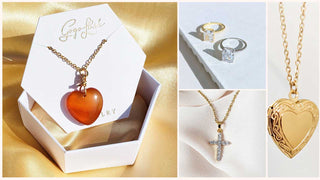When it comes to personalized jewelry, a custom necklace material plays a pivotal role in defining its appearance, durability, and overall charm. Whether you're creating a sentimental piece for yourself or a thoughtful gift for someone special, selecting the right material is a crucial decision that reflects your style and intentions.
The Significance of Material Choice
The material you choose for your custom necklace can influence its aesthetic, comfort, and longevity. Each material has its unique qualities, and understanding these characteristics will help you make an informed decision.
Gold: Timeless Elegance
Gold has been cherished for centuries, and for a good reason. Its timeless appeal and ability to retain its value make it a popular choice for custom necklaces. Available in various shades - yellow, white, and rose - gold allows for versatility in design. Whether you prefer a classic, minimalistic look or an intricate, ornate design, gold can cater to your preferences.
Silver: Sleek Sophistication
Silver exudes a sleek and contemporary charm. It's more affordable than gold, making it a practical choice without compromising on style. Sterling silver, a high-quality silver alloy, is often used in custom necklaces due to its durability and resistance to tarnishing. Its understated elegance complements various outfits and occasions.
Rose Gold: Romantic Allure
Rose gold has captured hearts with its romantic and feminine appeal. This alloy of gold and copper features a warm pink hue that can add a touch of softness to your custom necklace. Ideal for expressing sentiments of love and affection, rose gold is gaining popularity for its distinctive and captivating charm.
Platinum: Unparalleled Durability
For those seeking exceptional durability and a luxurious look, platinum is a top-tier option. Its naturally white sheen and resistance to wear and tear make it a sought-after material. While it may be pricier, its rarity and lasting beauty are undeniable.
Gemstones and Birthstones: Adding Colorful Meaning
Incorporating gemstones or birthstones into your custom necklace can infuse it with personal meaning and vibrant colors. Whether it's your birthstone, a loved one's birthstone, or a gemstone that holds significance to you, these additions can make your necklace truly one-of-a-kind.
Enamel: Artistic Expressions
Enamel is a material that involves fusing powdered glass onto metal, resulting in a beautifully colored and glossy finish. It's perfect for adding intricate designs, patterns, or even small images to your custom necklace. Enamel allows for artistic expression and can transform your necklace into a wearable work of art.
Wood and Organic Materials: Nature's Touch
For a unique and eco-friendly approach, consider custom necklaces made from wood or other organic materials like leather or shells. These materials can bring a natural and earthy feel to your jewelry, adding a touch of warmth and connection to the environment.
Making the Right Choice
When deciding on the material for your custom necklace, consider factors such as your personal style, the occasion you'll be wearing it for, and any sentimental value you want to incorporate. Additionally, think about the maintenance required for each material to ensure your necklace remains as beautiful as the day you received it.
Your Personalized Masterpiece
A custom necklace is more than just an accessory; it's a reflection of your individuality and emotions. The material you choose can enhance the significance of your piece and contribute to its overall beauty. Whether you opt for the classic elegance of gold, the modern appeal of silver, or the romantic allure of rose gold, your custom necklace will be a tangible representation of your style, memories, and sentiments - a masterpiece designed to be treasured forever worth adding to your personalized jewelry collection.

